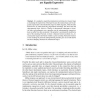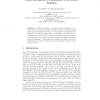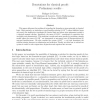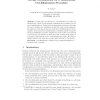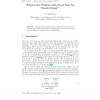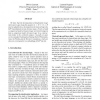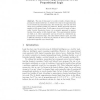108
Voted
APAL
2010
15 years 2 months ago
2010
We introduce a notion of Kripke model for classical logic for which we constructively prove soundness and cut-free completeness. We discuss the meaning of the new notion and its a...
122
click to vote
CSL
2010
Springer
15 years 3 months ago
2010
Springer
It is standard to regard the intuitionistic restriction of a classical logic as increasing the expressivity of the logic because the classical logic can be adequately represented i...
124
Voted
CADE
2010
Springer
15 years 3 months ago
2010
Springer
Abstract. We introduce a semantics for classical logic with partial functions. We believe that the semantics is natural. When a formula contains a subterm in which a function is ap...
129
Voted
ICLP
1995
Springer
15 years 6 months ago
1995
Springer
Abstract. The Event Calculus is a narrative based formalism for reasoning about actions and change originally proposed in logic programming form by Kowalski and Sergot. In this pap...
151
Voted
LFCS
1992
Springer
15 years 6 months ago
1992
Springer
This paper addresses the problem of extending the formulae-as-types principle to classical logic. More precisely, we introduce a typed lambda-calculus (-LK ) whose inhabited types...
122
Voted
TLCA
1999
Springer
15 years 7 months ago
1999
Springer
In this paper we present a strongly normalising cut-elimination procedure for classical logic. This procedure adapts Gentzen’s standard cut-reductions, but is less restrictive th...
105
Voted
TLCA
2001
Springer
15 years 7 months ago
2001
Springer
In this paper we introduce a cut-elimination procedure for classical logic, which is both strongly normalising and consisting of local proof transformations. Traditional cut-elimin...
121
click to vote
CIE
2010
Springer
15 years 7 months ago
2010
Springer
This paper is an informal (and nonexhaustive) overview over some existing notions of proof nets for classical logic, and gives some hints why they might be considered to be unsatis...
123
click to vote
LICS
2003
IEEE
15 years 8 months ago
2003
IEEE
We show that the decomposition of Intuitionistic Logic into Linear Logic along the equation ´ may be adapted into a decomposition of classical logic into LLP, the polarized versi...
109
click to vote
SBIA
2004
Springer
15 years 8 months ago
2004
Springer
Abstract. The aim of this paper is to study a family of logics that approximates classical inference, in which every step in the approximation can be decided in polynomial time. Fo...

